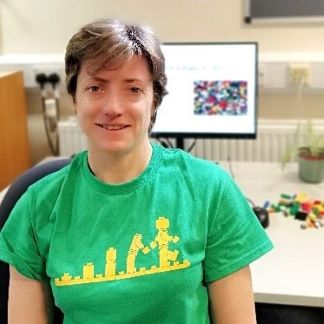Sam Pulman is a Postgraduate Researcher in the School of Education and a trained facilitator of LEGO® SERIOUS PLAY® method and materials
Many people ask what LEGO® SERIOUS PLAY® is and how does it work? LEGO® was created by Danish carpenter, Christiansen, 1932. From humble beginnings as a toy made of wood, there are approximately 125 million molded plastic pieces produced each day. Made of crude oil, LEGO® has not always sat well with environmental groups but LEGO® is looking into petroleum alternatives such as making bricks from sustainable palm oil and recycled plastics. I wonder if you have noticed some of the newer blocks are not as shiny or smooth as older blocks because they have less oil. For all you etymologists out there, ‘Leg Godt’ is the Danish word for ‘play well’ and was shortened to the brand name LEGO®. Additionally, the Latin verb “legō” means ‘I put together.’ Both definitions aptly fit the LEGO® ethos of being creative and playful.
From 2001-2006, the imagination lab researched the use of LEGO® as a strategic business tool for productivity. After many years of success LEGO® SERIOUS PLAY® materials and method became open source in 2010. LEGO® SERIOUS PLAY® in its purest form would take several days to complete. For example, working through a series of builds to generate ideas, designing a product, testing out ideas, and refining the strategy to make it all work. LEGO® activities provided by the University of Exeter are a taster of core elements including construct, metaphor, imagination, and storytelling, which form the process of LEGO® SERIOUS PLAY®.
The beauty of LEGO® is its limitless application, particularly in higher education, and you do not need expensive kits for a session. A simple choice of blocks is enough to take part and enjoy LEGO® SERIOUS PLAY®. Sometimes less is more, and fewer variety of bricks encourages participants to go back to basics, get creative and re-think the foundation of their challenge or task. Stepping back from online gaming, LEGO® blocks is a multi-sensory approach of touch, colour, and construction of a 3D model to bring abstract ideas into physical form. Dialogic learning occurs through participants storytelling behind the build and develops critical thinking and reflection for problem solving. You name it, and there is a LEGO® activity that can be created for specific scenario-based learning or part of a research project. For example, the Doctoral College, University of Exeter, delivers ‘Finding your way out of a rut’ and ‘Writer’s block’ through LEGO® SERIOUS PLAY® activities. This starts with warm-up builds such as picking a shape that reflects something about you to share with the group, followed by builds to overcome specific challenges and develop postgraduate research skills. You might even argue LEGO® as a research method! There are several learning theories that support LEGO® SERIOUS PLAY® materials and methods, based on how knowledge is constructed and experienced, which links with a myriad of pedagogical approaches but that is a blog for another time.
Having run several LEGO® SERIOUS PLAY® type sessions, I have also seen the benefit of simply putting bags of LEGO® and base boards on a table and watching groups of students gather and talk whilst making free-builds. LEGO® busies the hands to free the mind and let the playfulness flow. Who can resist delving into a bag of LEGO®? Additionally, LEGO® is a fantastic way to ‘build’ connections across faculties, student groups, and add to the vibrant research community at the University of Exeter. LEGO® has no agenda, no barriers and is an inclusive approach to explore challenges, concepts, and learning opportunities. There is no right or wrong builds, just use your imagination, keep it fun, trust the process, and seriously, be playful!
If you want to know more about LEGO® SERIOUS PLAY®, please visit https://www.exeter.ac.uk/research/doctoralcollege/researcherdevelopment/rdrc/ and https://universityofexeteruk.sharepoint.com/sites/EducationToolkit/SitePages/LEGO-Serious-Play.aspx You can also find LEGO® events on social media and university communications.

